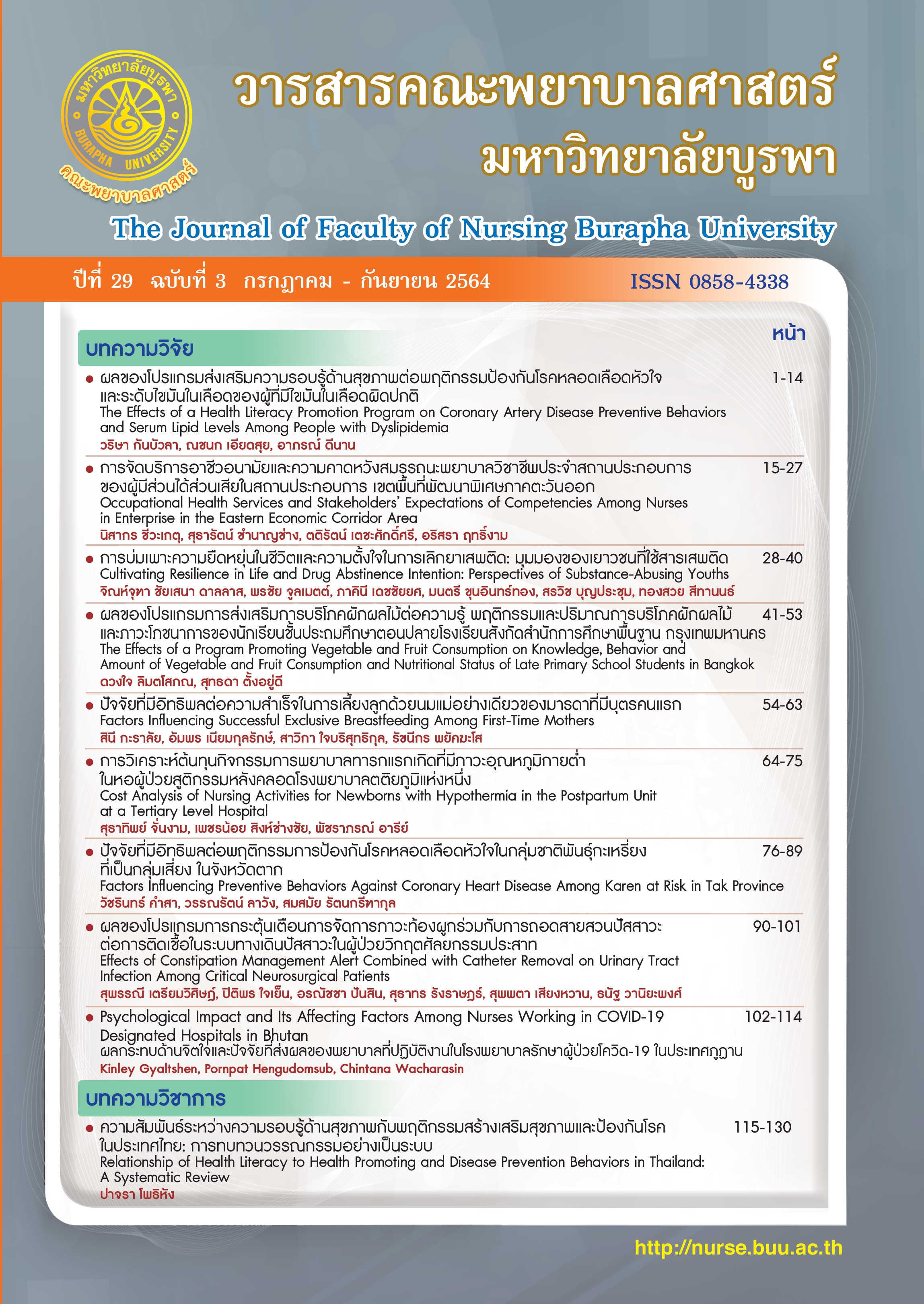Factors Influencing Successful Exclusive Breastfeeding Among First-Time Mothers
Keywords:
First time mother, breastfeeding attitude, exclusive breastfeedingAbstract
This predictive research aimed to study factors influencing successful exclusive breastfeeding among first-time mothers. The sample was 107 mothers taking their children to get vaccinated at the Queen Sirikit National Institute of Child Health. Date were collected by a demographic and exclusive breastfeeding record form, the Attitude Towards Breastfeeding Questionnaire, the Subjective Norm Questionnaire, Perceived Behavioral Control in Breastfeeding questionnaire. Data were analyzed using descriptive statistics and multiple regression.
The results showed that average time of exclusive breastfeeding among the first-time mothers was 3.25 months (SD = 2.12 months). Attitude towards breastfeeding, the subjective norm and
perceived behavioral control in breastfeeding combined could predict and explain 3.4% of the total variance of successful exclusive breastfeeding among the first-time mothers (adjusted R2 = .034,
F3,113 = 2.249, p < .05). Attitude towards exclusive breastfeeding was the only factor that significantly predicted successful exclusive breastfeeding (β = .249, p < .05). Nurses working at antenatal care units should provide interventions to enhance attitude towards breastfeeding among the first-time mothers in order to promote longer exclusive breastfeeding.
References
Organizational Behavior and Human
Decision Process, 50(2), 179-211. Retrieved
from http://dx.doi.org/10.1016/0749-5978
(91)90020-T
Alden, K. R. (2006). Newborn nutrition and feeding.
In D. L. Lowdermilk, & L. E. Perry (Eds.),
Maternity nursing (7th ed.) (pp. 617-630).
St. Louis: Mosby Elsevier.
Arpassakul, P. (2016). Discouraging factors of
breastfeeding among Thai women. Journal
of Public Health Nursing, 30(2), 133-146.
[in Thai]
Bai, Y., Middlestadt, S. E., Peng, C.-Y. J., & Fly, A.
D. (2009). Predictors of continuation of
exclusive breastfeeding for the first six
months of life. Journal of Human
Lactation, 26(1), 26-34. doi: 10.1177/
0890334409350168
Cernadas, J. M. C., Noceda, G., Barrera, L., Martinez,
A. M., & Garsd, A. (2003). Maternal and
perinatal factors influencing the duration
of exclusive breastfeeding during the first
6 months of life. Journal of Human
Lactation, 19(2), 136-144. doi:10.1177/
0890334403253292
Chanachai, S., Sinsuksai, N., Thananowan, N., &
Phahuwatanakorn, W. (2014). Knowledge,
attitude, self-efficacy, spousal and nurse
support predicting 6-weeks exclusive
breastfeeding. Journal of Nursing Science,
32(1), 51-60. [in Thai]
Chansiri, S., Phahuwatanakorn, W., & Yusamran, C.
(2017). Influences of breastfeeding
attitude subjective norm and self-efficacy
on intention to exclusive breastfeeding
among teenage pregnant women. Journal
of Nursing Science, 35(4), 49-60. [in Thai]
Chusilp, K. (2017). Breastfeeding and brain
development. Retrieved from https://
thaibf.com/wp-content/uploads/2017/
07/2- [in Thai]
Dodgson, J. E., Henly, S. J., Duckett, L., & Tarrant,
M. (2003). Theory of planned behaviorbased
models for breastfeeding duration
among Hong Kong mothers. Nursing
Research, 52(3), 148-158. doi: 10.1097/
00006199-200305000-00004
Ho, Y. J., & McGrath, J. M. (2011). Predicting
breastfeeding duration related to maternal
attitudes in a Taiwanese sample. Journal
of Perinatal Education, 20(4), 188-199.
doi: 10.189/1058-1243.20.4.188
Jancharoen, P. (2017). Factors influencing breast
feeding behaviors of mothers in territory
health promotion hospital in Tambon
bangtoey Muang Chachoengsao. Retrieved
from https://www.govesite.com/uploads/
20171120083444BU9XA7S/store/2017112
0154652sUS2Ysu.pdf [In Thai]
Kramer, M. S., & Kakuma, R. (2002). Optimal
duration of exclusive breastfeeding.
Cochrane Database of Systematic Reviews,
1, 1-40. doi:10.1002/14651858.cd003517
Karande S, & Perkar S. (2012). The lowa infant
feeding attitude scale. Retrieved from
https://www.researchgate.net/figure/
The-Iowa-infant-feeding-attitude-scale-8_
tbl1_236252238
National Statistical Office & United Nations
Children’s Fund. (2016). Thailand multiple
indicator cluster survey 2015- 2016, final
report. Bangkok: NSO and UNICEF.
National Statistical Office. (2020). Project to survey
the situation of children and women in
Thailand, multiple indicators cluster survey
2019, complete report. Bangkok: National
Statistical Office.
Persad, M. D., & Mensinger, J. L. (2007). Maternal
breastfeeding attitudes: Association with
breastfeeding intent and socio-demographics
among urban primiparas. Journal of
Community Health, 33(2), 53-60. doi:10.
1007/s10900-007-9068-2
Quinn, P., O’Callaghan, M., Williams, G., Najman,
J., Andersen, M., & Bor, W. (2001). The effect
of breastfeeding on child development
at 5 years: A cohort study. Journal of
Paediatrics and Child Health, 37(5),
465-469. doi: 10.1046/j.1440-1754.2001.
00702.x
Rao, M., Hediger, M., Levine, R., Naficy, A., & Vik,
T. (2002). Effect of breastfeeding on
cognitive development of infants born
small for gestational age. Acta Paediatrica,
91(3), 267-274. doi: 10.1080/0803525025
2833905
Swanson, V., & Power, K. G. (2005). Initiation and
continuation of breastfeeding: Theory of
planned behaviour. Journal of Advanced
Nursing, 50(3), 272-282. doi:10.1111/j.1365-
2648.2005.03390.x
Tabachnick, B. G., & Fidell, L. S. (2019). Using
multivariate statistics (7th ed). Boston:
Pearson Education.
Wangsawat, T., Kaleang, N., Phibal, A., Jaisomkom,
R., & Hayeese, W. (2014). Factors influencing
intention to exclusive breastfeeding for
6 months of mothers in Naradhiwat
province. Nursing Journal, 41(Special),
133-133.
World Health Organization [WHO]. (2011). Exclusive
breastfeeding for six months best for
babies everywhere. Geneva: World Health
Organization. Retrieved from http://www.
who.int/mediacentre/news/statements/
2011/breastfeeding_20110115/en/
World Health Organization [WHO]. (2014). Global
nutrition targets 2025 breastfeeding policy
brief. Retrieved from https://apps.who.int/
iris/handle/10665/149022





